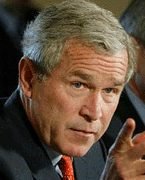 Before I get on with it, a quick apology for being a little late with this. I knew it'd take a while, and had some serious aikido and tango dancing to get on with...
Before I get on with it, a quick apology for being a little late with this. I knew it'd take a while, and had some serious aikido and tango dancing to get on with...
No doubt you'll all have noticed the debate following Seymour Hersh's article in the New Yorker a few days ago charging that senior members of the Bush administration are seriously considering a strike against Iran, possibly including a tactical nuclear warhead ('bunker-buster') against the Natanz uranium enrichment facility. If you have the time, I suggest you read Hersh's article before my humble opinions...The article draws upon and develops the theme from an article by Joseph Cirincione for Foreign Policy a couple of weeks ago exploring some US officials' apparent desire to go to war against Iran. The article was picked up by all the major news sources, including the Washington Post, the New York Times, the Telegraph, the Guardian and the BBC - so take your pic if you don't want to read the whole article by Hersh. The Arms Control Wonk also provides a nice in-depth exploration of the feasibility of using a nuke to destroy Natanz, and why (in his view) it won't happen.My original view, not having read the piece or any more in-depth reports, was that this was a negotiating technique on the part of the Bush administration. Simple: make the Iranians think they're really going to be blown to smithereens and they'll be much more accommodating diplomatically. My worry then was that the negotiating bluff would manage to become policy -- obviously administration officials can't admit it's a bluff even in their own circles, because they need the bluff to be believed. Consequently, it's all too easy for such a move to make hardline policy as officials argue the case so much that it becomes a mindset. But I digress. Although the 'bluff' theory seems to be Iranian President Ahmadinejad's view (see above link to BBC article), after reading Hersh's article, and related ones, I'm now inclined to think that some officials actually think they could manage to (militarily) destroy the program once-and-for-all, and gain something by doing so. One of the main themes of the various articles published has been the immense difficulty posed by destroying Iran's program so that it could not be restarted. These tend to focus on the types of weapons necessary, up to tactical nuclear earth-penetrating bombs that don't yet exist, and the types of targets, from a select few nuclear establishments scattered far and wide to every notable defence establishment including missile sites, airfields, and the like. Yet the danger here is that by focusing on such questions, leading to possible answers stating that it is possible (given a lot of effort), we tend to overlook the initial question of why. Hersh's piece states: One former defense official, who still deals with sensitive issues for the Bush Administration, told me that the military planning was premised on a belief that "a sustained bombing campaign in Iran will humiliate the religious leadership and lead the public to rise up and overthrow the government." He added, "I was shocked when I heard it, and asked myself, 'What are they smoking?' "
Indeed. This is a serious error of logic. Picture this - your home town is attacked by another town with devestating effect. Even though you didn't really like most of the victims, a lot of the municipal property of the town and its defences have also been destroyed. Do you eject the town's elected leaders? Or do you rally around the leader, with the rest of your town, against the other town? Plainly such an attack would not cause the regime change some officials seem to hope for. The goal of regime change must also be questioned. Here's Hersh again:
The rationale for regime change was articulated in early March by Patrick Clawson, an Iran expert who is the deputy director for research at the Washington Institute for Near East Policy and who has been a supporter of President Bush. "So long as Iran has an Islamic republic, it will have a nuclear-weapons program, at least clandestinely," Clawson told the Senate Foreign Relations Committee on March 2nd.
This misses the point entirely. The link between the Islamic Republic and the nuclear-weapons program is just as strong as that between all potential leaders of Iran and the program. It is one of the few areas of Iranian politics on which there is a consensus -- largely a result of the constant threat posed by America, whether real or not. Such a drastic regime change does seem way over the top when you consider firstly that the program will take at least 10 years or so to make a bomb, and secondly that a lot of the Iranian public are already wary of the current leadership for forcing this crisis with America, and are fairly likely to vote for quite a different government at the next election. Unless, of course, they find some reason to rally around Ahmadinejad, that is...
 I don't go to many concerts, but yesterday I went to the best I've been to in at least a couple of years. Thanks to my friend Kamila Xenie Vetišková (good name, eh?) I found myself in a nicely industrial space near Palmovka on the outskirts of Prague—the perfect setting for the Bajofondo Tango Club. It's hard to convey the sheer pleasure at experiencing such music—easiest described as a cross between tango and club dance music—played live. Bajofondo fuse tango into club music with a perfect feel for tango's mix of drama, passion and nostalgia.
I don't go to many concerts, but yesterday I went to the best I've been to in at least a couple of years. Thanks to my friend Kamila Xenie Vetišková (good name, eh?) I found myself in a nicely industrial space near Palmovka on the outskirts of Prague—the perfect setting for the Bajofondo Tango Club. It's hard to convey the sheer pleasure at experiencing such music—easiest described as a cross between tango and club dance music—played live. Bajofondo fuse tango into club music with a perfect feel for tango's mix of drama, passion and nostalgia.